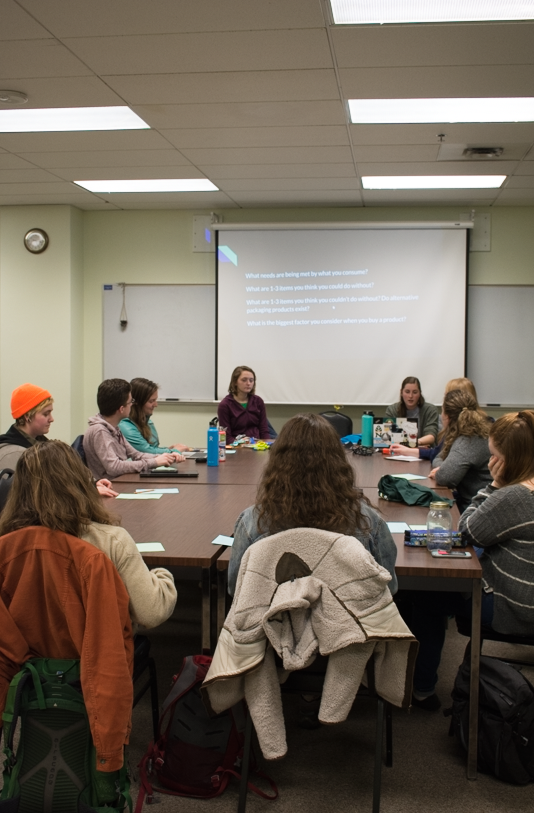“What does action look like to you?” asked EcoReps co-founder Georgia Harrison at a recent workshop about sustainability.
“Buying 300 lbs of bulk items from the food co-op,” said a student at the event.
EcoReps hosted their fourth event, Reducing Waste Through Consumer Decision-Making, as a part of their Sustainability Workshop Series from 5 to 6:30 p.m on Feb. 27 in the University Center. A series of discussion questions were asked reflecting on how an individual can be a conscious consumer.
EcoReps members Harrison, senior ecology major, and Marissa Lindstrom, junior environmental studies major, explained that consumers cast their vote of what companies and practices they support through their consumption of goods and services, otherwise known as voting with your dollar. Every dollar spent is a dollar that supports the company, Harrison said, adding that creating lasting change starts with the individual.
“Make choices on what you’re buying and what business practices you’re supporting. The current political system can feel disenfranchised, but voting with your dollar is something you can do every day,” Harrison said.
Harrison urged people to prioritize an issue that they’re passionate about, as it’s easier to stick with a cause that they care for.
“If you’re really jazzed about salmon, research what current threats there are and what you can do to help,” Harrison said.
A simple Google search can reveal a company’s commitment to environmental standards, Harrison said. This easy access to information has allowed consumers to decipher which companies are greenwashing, when a company falsely advertises their sustainable practices through a misleading “green” appearance.
“Once consumers say it’s important to them, it becomes important to the company,” said Harrison.
In the workshop, Lindstrom discussed seven
ways to make a difference with your dollar. The list recommended that consumers reduce waste by purchas ing fair trade local products that are energy efficient, used and made with sustainable materials.
Also mentioned in the workshop were online companies and local businesses which employ sustainable packaging practices.
“I found it interesting that you can request different packaging when online shopping to have less materials,” said A b b y Blanchard, senior fisheries and wildlife management major.
Superior Outfitters, an outdoor gear resale shop, is one among many Marquette business that prioritize waste reduction, mentioned a student at the workshop. Instead of throwing tattered old t-shirts away, students repurposed them into reusable bags as a way to reduce their impact. “We would aggressively use paper towels in my family growing up,” recalled Harrison. “Now we use old rags that we wash frequently.”
In order to incorporate sustainability into your everyday life, Oliva Walcott, environmental studies major, said she always has to be prepared. For example, she brings a glass container when eating out to avoid using a to-go box.
“It’s easier to take the convenient route when making consumer decisions, especially for busy college students on a budget,” said Lindstrom.
This event is supported by the Student Finance Committee and sponsored by NMU EcoReps.
The next event is “Composting: How, When, Where, and Why” on March 13 at the Marquette Room in the University Center.

























